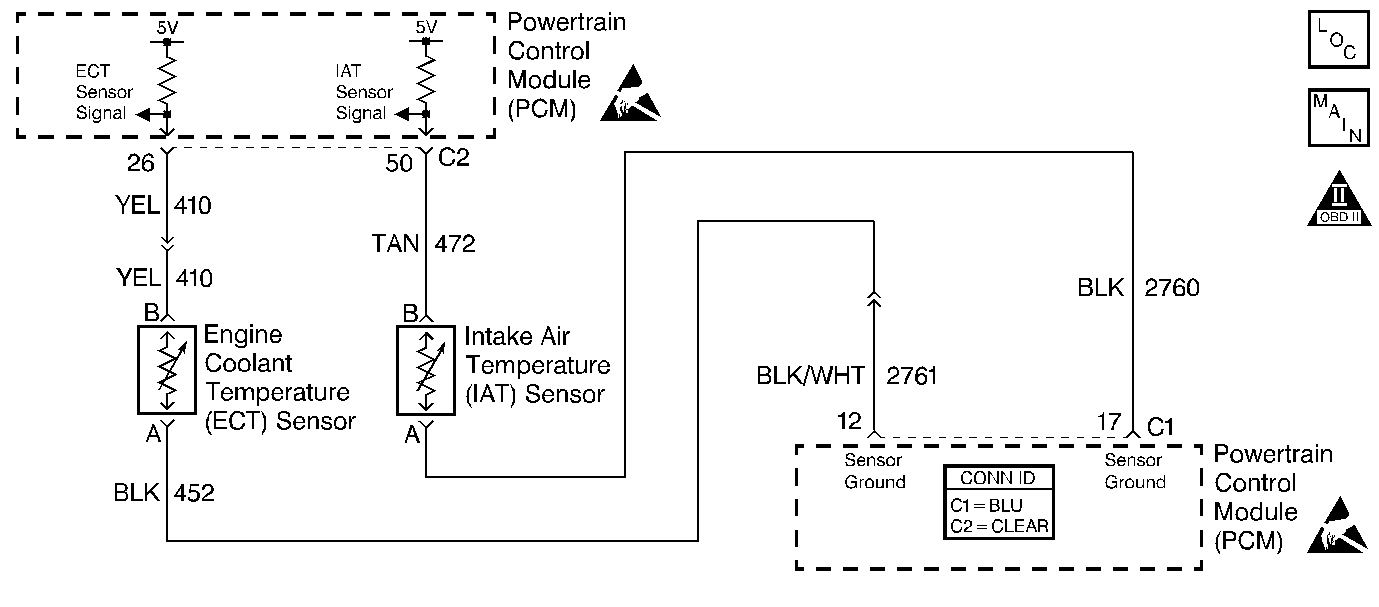
Circuit Description
The Intake Air Temperature (IAT) sensor is a thermistor which measures the temperature of the air entering the engine. The PCM applies 5.0 volts through a pull up resistor to the IAT sensor. When the intake air is cold, the sensor resistance is high and the PCM will monitor a high signal voltage on the IAT signal circuit. If the intake air is warm, the sensor resistance is lower causing the PCM to monitor a lower voltage. DTC P1112 will set when the PCM detects an intermittently low signal voltage on the intake air temperature sensor signal circuit.
Conditions for Running the DTC
| • | The engine has been running for over 10 seconds. |
| • | Vehicle speed is greater than 25 mph. |
Conditions for Setting the DTC
| • | The IAT sensor indicates an intake air temperature intermittently greater than 135°C (275°F). |
| • | The conditions is present for up to 5 seconds. |
Action Taken When the DTC Sets
| • | The PCM will not illuminate the malfunction indicator lamp (MIL). |
| • | The PCM will store conditions which were present when the DTC set as Failure Records data only. This information will not be stored as Freeze Frame data. |
Conditions for Clearing the MIL/DTC
| • | A History DTC will clear after 40 consecutive warm-up cycles have occurred without a malfunction. |
| • | The DTC can be cleared by using the scan tool Clear Info function. |
Diagnostic Aids
Check for the following conditions:
| • | Poor connection at PCM. Inspect harness connectors for backed out terminals, improper mating, broken locks, improperly formed or damaged terminals, and poor terminal to wire connection. |
| • | Damaged harness. Inspect the wiring harness for damage. If the harness appears to be OK, observe the IAT display on the scan tool while moving connectors and wiring harnesses related to the IAT sensor. A change in the IAT display will indicate the location of the fault. |
Refer to Testing for Continuity , Intermittents and Poor Connections Diagnosis , Repairing Connector Terminals , and Connector Repairs in Wiring Systems.
Reviewing the Fail Records vehicle mileage since the diagnostic test last failed may help determine how often the condition that caused the DTC to be set occurs. This may assist in diagnosing the condition.
Test Description
The numbers below refer to the step numbers on the Diagnostic Table:
-
Verifies that the fault is present.
-
If DTC P1112 can be repeated only by duplicating the Fail Records conditions, refer to the Temperature vs Resistance Table. The table may be used to test the IAT sensor at various temperatures to evaluate the possibility of a shifted sensor that may be shorted above or below a certain temperature. If this is the case, replace the IAT sensor.
Step | Action | Value(s) | Yes | No |
|---|---|---|---|---|
1 | Was the Powertrain On-Board Diagnostic System Test performed? | -- | ||
Select Diagnostic Troble Codes (DTCs) and note any other DTCs set. Is DTC P0112 Intake Air Temperature (IAT) Sensor Circuit Low Voltage also set? | -- | Go to DTC P0112 Intake Air Temperature (IAT) Sensor Circuit Low Voltage | ||
Was a problem found? | -- | Go to Diagnostic Aids | ||
4 |
Does scan tool indicate DTC P1112 failed? | -- | System OK |
